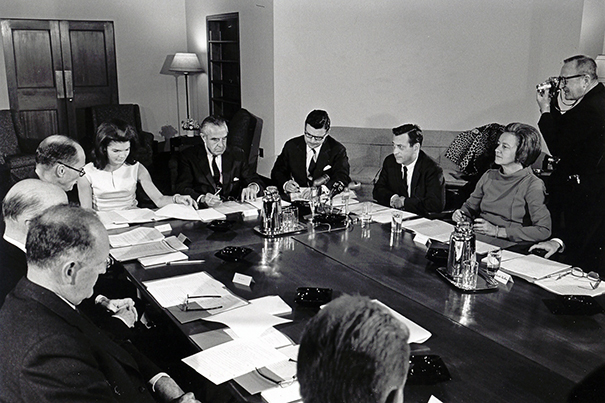
First lady Jacqueline Kennedy presides over the first-ever IOP Senior Advisory Committee meeting. Starting just to Kennedy’s right, going clockwise: Nathan Pusey, president of Harvard University, Kennedy, W. Averell Harriman, chairman, IOP Senior Advisory Committee, Michael Forrestal,executive secretary, IOP Senior Advisory Committee, Richard Neustadt, director, Institute of Politics, Katharine Graham, member, IOP Senior Advisory Committee.
Courtesy of the IOP
Institute of Politics, 50 years in
On anniversary, alumni reflect on how it framed their future careers in public service
At a time when the noble aim of politics feels like it has been consumed by negativity, the Institute of Politics (IOP) at Harvard Kennedy School (HKS) has stayed true to the notion that politics and even governing can be forces for good.
Established as a memorial to President John F. Kennedy and his famous call to America’s youth to give back to the country, for half a century the IOP has inspired and prepared Harvard undergraduates to consider and take up a life in politics and public service through an array of offerings, including its fellows program, summer internships, and lectures by world leaders and newsmakers in the JFK Jr. Forum.
This week, alumni and fellows will return to campus as the IOP hosts a three-day celebration Thursday through Saturday to mark its 50th anniversary.
50 years of history at the IOP
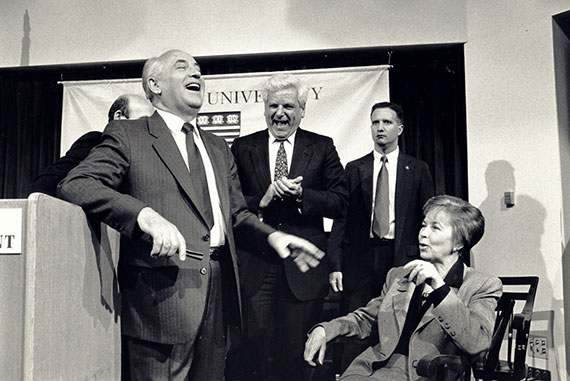
Former President of the Soviet Union Mikhail Gorbachev addresses the JFK Jr. Forum, May 16, 1992. Photo by Martha Stewart
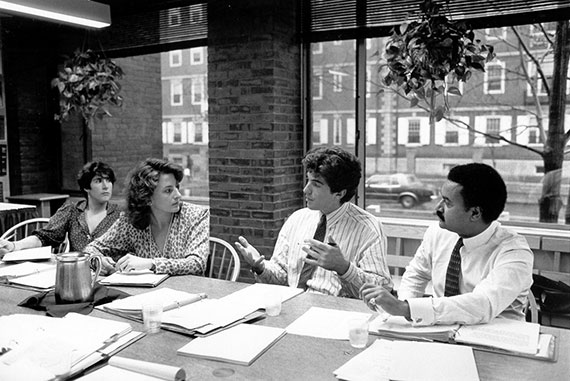
John F. Kennedy Jr. (center) and Ron Brown (far right) with students during a fall 1987 IOP Senior Advisory Committee meeting. Photo by Martha Stewart
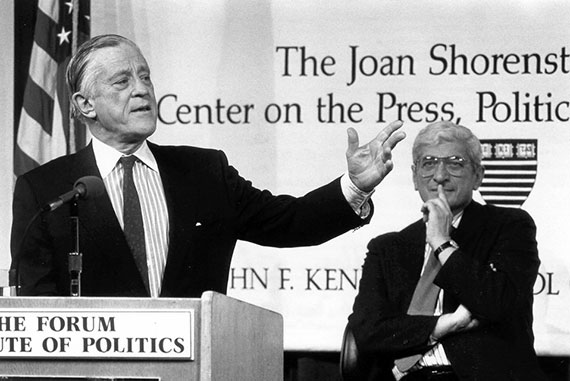
Ben Bradlee, executive director of the Washington Post, delivers a 1991 speech in the JFK Jr. Forum on “The Press and Public Policy in the Age of Manipulation,” as Marvin Kalb, Edward R. Murrow Professor of Practice emeritus, looks on. Courtesy of the IOP
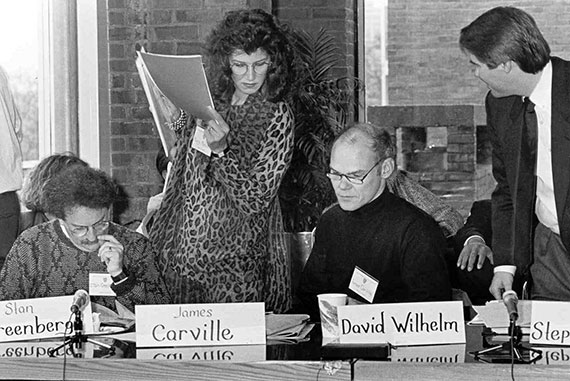
Stan Greenberg (from left), Mary Matalin, and James Carville at the IOP’s fall 1992 Campaign Decision Makers Conference. Photo by Martha Stewart
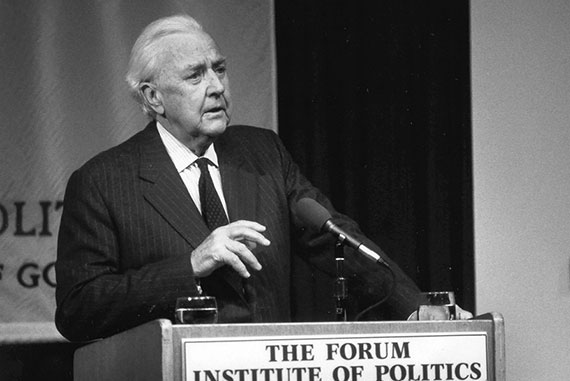
U.S. senator and former presidential candidate Eugene McCarthy addresses the JFK Jr. Forum, March 17, 1992. Photo by Martha Stewart
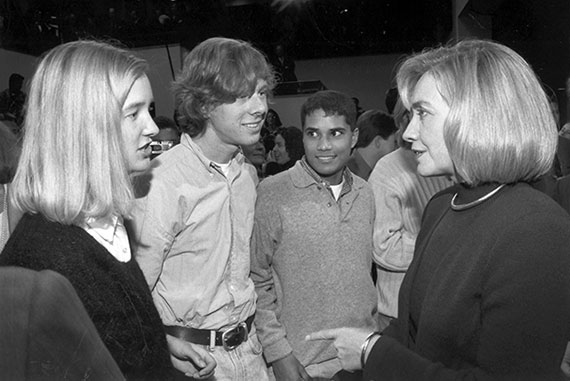
Hillary Clinton speaks to students at the Harvard Kennedy School.
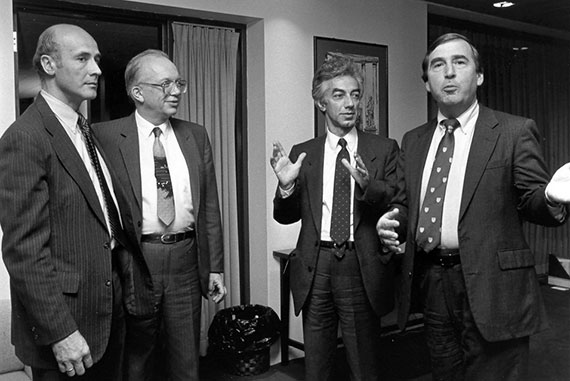
Joseph Nye (from left), director of the Belfer Center for Science and International Affairs; Sergei Khrushchev, son of Soviet Chairman Nikita Khrushchev; Sergo Mikoyan, son of Soviet First Deputy Premier Anastas Mikoyan; and Graham Allison, dean of the Harvard Kennedy School, at dinner before the JFK Jr. Forum discussion “On the Brink: A Soviet Re-examination of the Cuban Missile Crisis,” Feb. 15, 1989. Photo by Martha Stewart
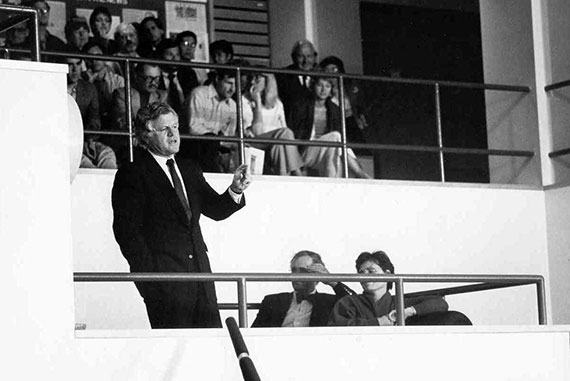
Sen. Edward M. Kennedy during a JFK Jr. Forum event with Sen. Daniel Patrick Moynihan on “America’s Poor: What is to be Done?” in September 1986. Photo by Martha Stewart
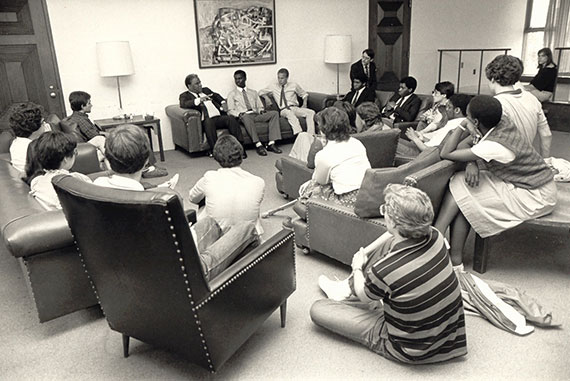
Harold Washington, mayor of Chicago, with Harvard College students at Quincy House, April 1984. Photo by Martha Stewart
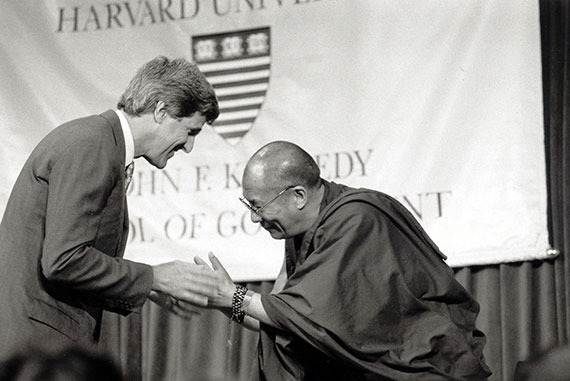
Sen. John Kerry and His Holiness the Dalai Lama at the JFK Jr. Forum, Sept. 10, 1995. Photo by Martha Stewart
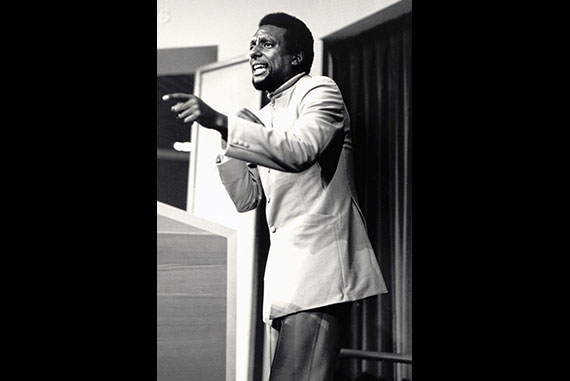
Activist Stokely Carmichael in the JFK Jr. Forum in 1979. Photo by Richard Feldman
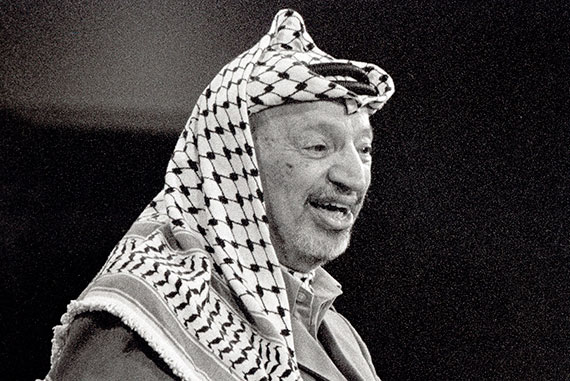
Yasser Arafat, president of the Palestinian National Authority, addresses the JFK Jr. Forum, Oct. 24, 1995. Photo by Martha Stewart
Rep. Elise Stefanik ’06, who represents New York’s 21st Congressional District and at age 30 is the youngest woman ever elected to the U.S. House, got her start when she was chosen to help run a weekly study group for Ted Sorensen, President Kennedy’s former speechwriter, then a senior IOP fellow. “That to me was just an amazing experience. After that, I was hooked,” she said.
While at Harvard, Stefanik also taught civics to Boston and Cambridge public school students as part of the IOP’s civics program, worked on the Harvard Public Opinion Project, and launched the Women’s Initiative in Leadership program during her senior year. She credits the IOP with instilling the skills and confidence that prepared her to run for office.
“There is no other institution around the world that is at the caliber of the Institute of Politics in terms of exposure and having a seat at the table to discuss issues with world leaders, political practitioners, and well-respected members of the media,” she said.
For Massachusetts State Sen. Eric Lesser ’07, the IOP led him to volunteer for the presidential campaign of Barack Obama in 2007-2008, right after his graduation.
“I think what the IOP did more than anything was just draw in my perspective and really taught me that there were a lot of other people … who had idealism about the process, that had idealism about the need to get involved,” said Lesser, who went on to work as an aide to the Obama campaign’s chief strategist, David Axelrod, in the White House, where the institute’s impressive alumni network was a professional and social boon for a young staffer.
“The chance to meet so many other students your age, similar in the same types of work that you are doing, who are also motivated by this idealistic sense that government can be a source for good for people, is a unique opportunity. And it will serve you your whole career because those friendships you’ll make at the IOP — the relationships you’ll build at the IOP — they’re your classmates and friends, and they’re also going to be your colleagues for years into the future.”
The future of politics
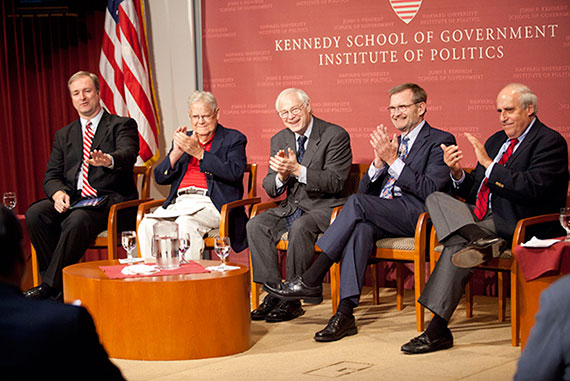
During “A Conversation with Former IOP Directors” in September 2011, moderator Trey Grayson (from left), director of the Institute of Politics; Jonathan Moore, associate of the Shorenstein Center; Jim Leach, chairman of the National Endowment for the Humanities; Phil Sharp, president of Resources for the Future; Dan Glickman, executive director of the Aspen Institute Congressional Program; and U.S. Sen. Jeanne Shaheen (via videolink) speak inside the John F. Kennedy Jr. Forum. Kris Snibbe/Harvard Staff Photographer

The Hon. Nancy Pelosi, speaker of the United States House of Representatives, visits the Harvard Kennedy School’s Institute of Politics, Nov. 13, 2009. Photo by Jill Foley
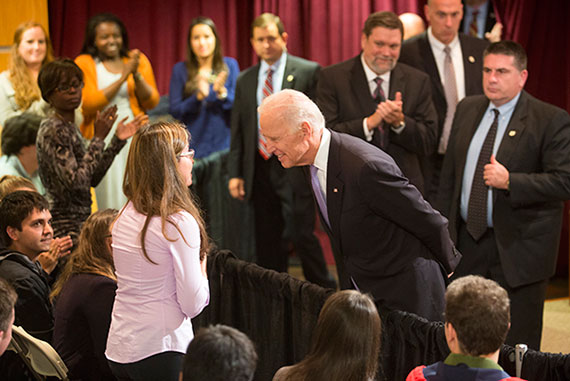
U.S. Vice President Joseph R. Biden speaks with Harvard Kennedy School student Emelia San Miguel after delivering a foreign policy address on Oct. 2, 2014. Jon Chase/Harvard Staff Photographer
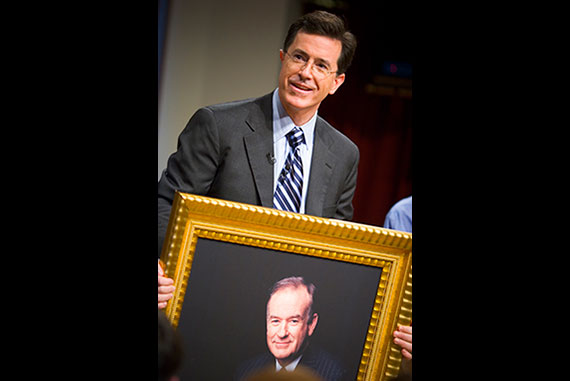
Stephen Colbert, host of “The Colbert Report” on Comedy Central, holds a portrait of radio talk show host Bill O’Reilly at the Harvard Kennedy School, Dec. 1, 2006. Photo by Justin Ide
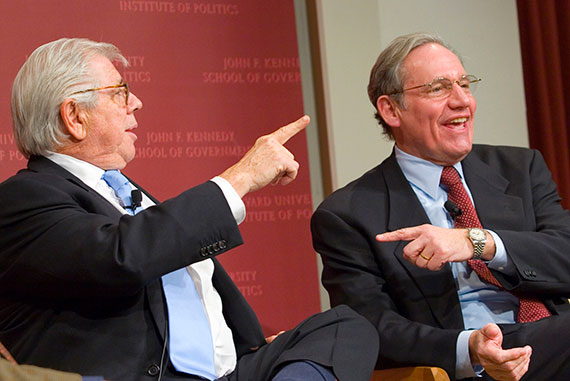
Carl Bernstein (left), contributing editor of Vanity Fair, and Bob Woodward, assistant managing editor of The Washington Post, spoke with Alex Jones, director of the Shorenstein Center, at the JFK Jr. Forum, Dec. 5, 2005. The forum was titled “Anonymous Sources: Lessons Learned.” Stephanie Mitchell/Harvard Staff Photographer
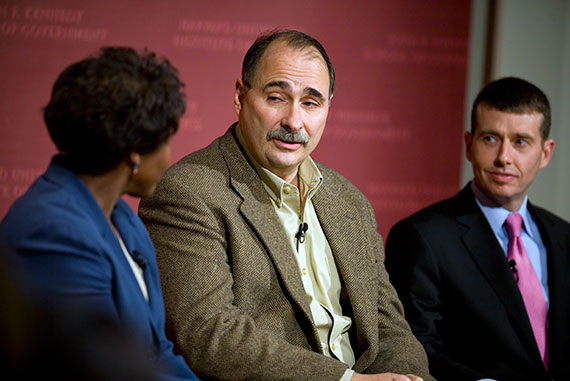
On Dec. 11, 2008, Gwen Ifill (from left), managing editor of Washington Week, moderated the JFK Jr. Forum “War Stories,” a conversation with David Axelrod, chief strategist for the Obama presidential campaign, and David Plouffe, campaign manager for the Obama presidential campaign, and (not pictured) Rick Davis, campaign manager for the John McCain presidential campaign, and Bill McInturff, chief pollster for the McCain presidential campaign. Photo by Justin Ide
“For me, their summer stipend [$500] proved a defining part of my career because it allowed me to go to Washington to intern for my congressman, Rev. Robert Drinan, the Jesuit priest, a Democrat from Massachusetts,” said Mark Gearan ’78, former head of the Peace Corps and now president of Hobart and William Smith Colleges in New York.
“It allowed me to see pathways into public policy for careers; it allowed me to exchange ideas with people who were very different from me. My senior college roommate was then the president of the Republican Club, [conservative radio talk show host] Hugh Hewitt. We were an unlikely rooming pair politically. But I think that has always been a hallmark of the institute — working in a nonpartisan way to encourage young people to think about careers in politics and public service,” he said. “That was important in 1978 when I was there … [and] it could not be more important for what the institute’s doing for the next 50 years.”




